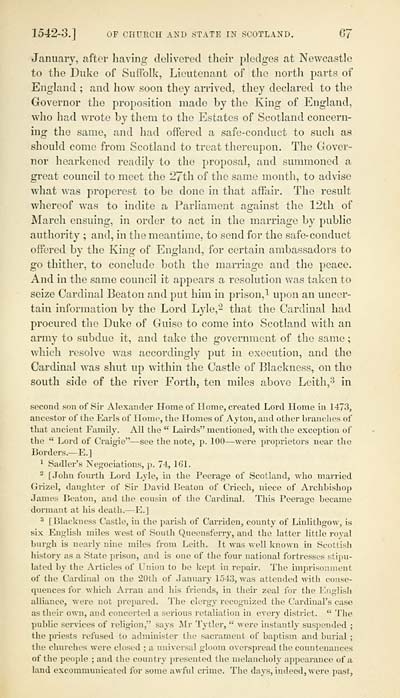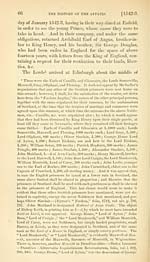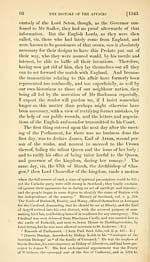Spottiswoode Society > History of the affairs of the Church and State of Scotland from the beginning of the reformation to the year 1568 > Volume 1
(203) Page 67
Download files
Complete book:
Individual page:
Thumbnail gallery: Grid view | List view

1542-3.] OF CHURCH AND STATE IN SCOTLAND. GJ
January, after having delivered their pledges at Newcastle
to the Duke of Suffolk, Lieutenant of the north parts of
England ; and how soon they arrived, they declared to the
Governor the proposition made by the King of England,
who had wrote by them to the Estates of Scotland concern-
ing the same, and had offered a safe-conduct to such as
should come from Scotland to treat thereupon. The Gover-
nor hearkened readily to the proposal, and summoned a
great council to meet the 27th of the same month, to advise
what was properest to be done in that affair. The result
whereof was to indite a Parliament against the 12th of
March ensuing, in order to act in the marriage by public
authority ; and, in the meantime, to send for the safe-conduct
offered by the King of England, for certain ambassadors to
go thither, to conclude both the marriage and the peace.
And in the same council it appears a resolution was taken to
seize Cardinal Beaton and put him in prison, 1 upon an uncer-
tain information by the Lord Lyle, 2 that the Cardinal had
procured the Duke of Guise to come into Scotland with an
army to subdue it, and take the government of the same ;
which resolve was accordingly put in execution, and the
Cardinal was shut up within the Castle of Blackness, on the
south side of the river Forth, ten miles above Leith, 3 in
second son of Sir Alexander Home of Home, created Lord Home in 1473,
ancestor of the Earls of Home, the Homes of Ayton, and other branches of
that ancient Family. All the " Lairds" mentioned, with the exception of
the " Lord of Craigie" — see the note, p. 100 — were proprietors near the
Borders.— E.]
1 Sadler's Negociations, p. 74, 161.
2 [John fourth Lord Lyle, in the Peerage of Scotland, who married
Grizel, daughter of Sir David Beaton of Criech, niece of Archbishop
James Beaton, and the cousin of the Cardinal. This Peerage became
dormant at his death. — E.]
3 [Blackness Castle, in the parish of Carriden, county of Linlithgow, is
six English miles west of South Queensferry, and the latter little royal
burgh is nearly nine miles from Leith. It was well known in Scottish
history as a State prison, and is one of the four national fortresses stipu-
lated by the Articles of Union to be kept in repair. The imprisonment
of the Cardinal on the 20th of January 1543, was attended with conse-
quences for which Arran and his friends, in their zeal for the English
alliance, were not prepared. The clergy recognized the Cardinal's case
as their own, and concerted a serious retaliation in every district. " The
public services of religion," says Mr Tytler, " were instantly suspended ;
the priests refused to administer the sacrament of baptism and burial ;
the churches were closed ; a universal gloom overspread the countenances
of the people ; and the country presented the melancholy appearance of a
land excommunicated for some awful crime. The days, indeed, Avere past,
January, after having delivered their pledges at Newcastle
to the Duke of Suffolk, Lieutenant of the north parts of
England ; and how soon they arrived, they declared to the
Governor the proposition made by the King of England,
who had wrote by them to the Estates of Scotland concern-
ing the same, and had offered a safe-conduct to such as
should come from Scotland to treat thereupon. The Gover-
nor hearkened readily to the proposal, and summoned a
great council to meet the 27th of the same month, to advise
what was properest to be done in that affair. The result
whereof was to indite a Parliament against the 12th of
March ensuing, in order to act in the marriage by public
authority ; and, in the meantime, to send for the safe-conduct
offered by the King of England, for certain ambassadors to
go thither, to conclude both the marriage and the peace.
And in the same council it appears a resolution was taken to
seize Cardinal Beaton and put him in prison, 1 upon an uncer-
tain information by the Lord Lyle, 2 that the Cardinal had
procured the Duke of Guise to come into Scotland with an
army to subdue it, and take the government of the same ;
which resolve was accordingly put in execution, and the
Cardinal was shut up within the Castle of Blackness, on the
south side of the river Forth, ten miles above Leith, 3 in
second son of Sir Alexander Home of Home, created Lord Home in 1473,
ancestor of the Earls of Home, the Homes of Ayton, and other branches of
that ancient Family. All the " Lairds" mentioned, with the exception of
the " Lord of Craigie" — see the note, p. 100 — were proprietors near the
Borders.— E.]
1 Sadler's Negociations, p. 74, 161.
2 [John fourth Lord Lyle, in the Peerage of Scotland, who married
Grizel, daughter of Sir David Beaton of Criech, niece of Archbishop
James Beaton, and the cousin of the Cardinal. This Peerage became
dormant at his death. — E.]
3 [Blackness Castle, in the parish of Carriden, county of Linlithgow, is
six English miles west of South Queensferry, and the latter little royal
burgh is nearly nine miles from Leith. It was well known in Scottish
history as a State prison, and is one of the four national fortresses stipu-
lated by the Articles of Union to be kept in repair. The imprisonment
of the Cardinal on the 20th of January 1543, was attended with conse-
quences for which Arran and his friends, in their zeal for the English
alliance, were not prepared. The clergy recognized the Cardinal's case
as their own, and concerted a serious retaliation in every district. " The
public services of religion," says Mr Tytler, " were instantly suspended ;
the priests refused to administer the sacrament of baptism and burial ;
the churches were closed ; a universal gloom overspread the countenances
of the people ; and the country presented the melancholy appearance of a
land excommunicated for some awful crime. The days, indeed, Avere past,
Set display mode to: Large image | Transcription
Images and transcriptions on this page, including medium image downloads, may be used under the Creative Commons Attribution 4.0 International Licence unless otherwise stated. ![]()
| Permanent URL | https://digital.nls.uk/79599224 |
|---|
| Description | Volume I. |
|---|---|
| Attribution and copyright: |
|

